Shared Calendar: The Benefits of Collaborative Scheduling
Background
The concept of a calendar is an ancient one, dating back thousands of years. From the earliest lunar and solar calendars to the Roman calendar, people have always sought to keep track of the passage of time and important events. However, with the advent of digital technology, calendars have evolved into a whole new realm of convenience and efficiency. The rise of digital calendars has enabled us to organize our lives in a way that was never before possible, with features such as reminders and recurring events. Mobile devices have made calendars even more accessible than ever before, allowing you to have your schedule readily available on the go, no matter where you are.. The shared calendars concept is taking that convenience to a whole new level. As we become increasingly connected and social, the need for a shared calendar platform has become more pressing. GroupCal is at the forefront of this revolution, providing cutting-edge technology to enable seamless collaboration and organization. In this article, we will explore the benefits and features of a shared calendar, and how it can enhance productivity and organization in both personal and professional settings.
What is a shared calendar?

A shared calendar allows a group of people to schedule and manage events collaboratively. The calendar is shared among a predetermined member list, and depending on the settings of the calendar, some or all members can add, edit or delete events. This feature makes it easier for the calendar members to keep track of the shared schedules and plan accordingly. Additionally, an online shared calendar has an automatic sync function, which means that all members see changes in real-time, ensuring that everyone is up-to-date. Shared calendars are particularly useful for teams, families, businesses and in general – groups of common interest, with a shared schedule.
Understanding the distinction between a shared calendar and the shared calendar app which presents it, is also important. In a calendar app, there might be multiple shared calendars, each managing the schedules of different topics or groups. Therefore, the app needs to provide its users with the flexibility and convenience to control and manage these shared calendars effectively. The app should allow users to easily view and access all their shared calendars in one place and enable them to edit, add or delete events with ease. Additionally, features like reminders, notifications and syncing across different devices are essential for ensuring that all users stay up-to-date with the latest changes to the shared calendars.
A shared calendar is similar to a group chat in that it is a communication tool that enables group members to share information with each other in real-time. Just as a group chat app allows users to send messages, images, and files to a group of people, a shared calendar allows users to share events, tasks, and schedules with the entire group. Moreover, both tools are designed to be collaborative, and all members have equal access to the information shared. In essence, a shared calendar is like a group chat for scheduling and organizing events.
What is the difference between traditional calendars and shared calendars?
The fundamental difference between traditional calendars and shared calendars is their focus. Traditional calendars are designed to manage the schedule of a single person, while shared calendars are built to facilitate the automatic sharing of schedules among a group. In traditional calendars, meeting invites are the primary mechanism for sharing events, which limits collaboration and restricts access to event details to only those who receive the invite. This approach may work for private schedules or when only a few events need to be shared. However, for schedules that require a group of people to be aware of, sending invites for each event becomes inefficient and time-consuming. On the other hand, shared calendars prioritize collaboration by allowing users to create a group of members once, and from that point on, all group members have access to the shared calendar events, without the need for meeting invites. This approach streamlines the collaboration process and allows for seamless communication, ensuring that everyone is on the same page. Additionally, shared calendars can be used to manage multiple calendars for different groups or topics, making it easier to keep track of all events and schedules in one place.
While traditional calendars can still be useful for personal scheduling, they have limitations when it comes to team collaboration. For private events or appointments, traditional calendars can still be effective. However, when working in a team, shared calendars offer a more efficient and collaborative solution for coordinating schedules.
A well-designed calendar app should provide both personal and shared calendars, giving users the flexibility to manage their schedules in a way that works best for them. Personal calendars should be kept private, while shared calendars should be visible to the entire group to facilitate better coordination and communication. In conclusion, a combination of traditional and shared calendars, along with a well-designed calendar app, can help users manage their schedules effectively and efficiently.
The need to transition from a traditional calendar to a shared calendar
Our lives are becoming increasingly complex and interconnected, and our schedules are no exception. We often need to coordinate our schedules with others, and our schedules are frequently determined by external factors such as university classes, kids’ classes, work schedules, and extracurricular activities. This makes it difficult to keep track of everything using a traditional calendar, which is based on individual schedules and does not account for external factors.
Shared calendar apps provide a more comprehensive solution to scheduling as they enable users to link external shared calendars that constitute different parts of their lives that are relevant to their schedule. Those external shared calendars can hook into one’s calendar and automatically update as the schedule updates. For example, a user may link their work calendar, personal calendar, and community calendar to one shareable calendar app. This integration can provide a holistic view of their schedule and improve their ability to manage their time effectively. Additionally, users can link external calendars from other individuals or organizations that affect their schedules, such as school calendars or public event calendars. This allows users to automatically stay informed about external events that may impact their schedule, such as holidays or important deadlines. With the ability to link external calendars and access the calendar from any device, shared calendar apps offer a flexible and convenient solution for managing schedules collaboratively.
In-depth explanation about the features of shared calendar
Predetermined calendar members
One of the primary advantages of using a shared calendar is the ability to grant access to a group of users who can view and modify events. In a shared calendar application, members can be invited to join the calendar or share a link for others to access it. Once a member is added, they can immediately view and modify events in real-time, ensuring that everyone is aware of the latest changes. Using a shared calendar eliminates the need to individually notify others about each event or coordinate multiple emails or messages to schedule events, as all members receive automatic real-time updates by being a part of the shared calendar.
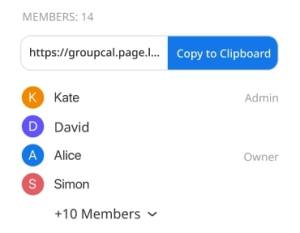
With GroupCal, users can easily send text message invitations or share links to join the calendar, making collaboration and coordination a breeze.
Real-time updates
Real-time updates are one of the most critical aspects of a shared calendar. This means that any modifications made to the calendar are instantly communicated to all members. This immediate notification ensures that everyone is kept in the loop and can quickly address any conflicts or changes that may arise. By providing real-time updates, a shared calendar streamlines communication, enhances collaboration, and minimizes the risk of miscommunication or scheduling errors. Consequently, this feature enables groups to work more efficiently and effectively together, saving time and ensuring that everyone is on the same page.
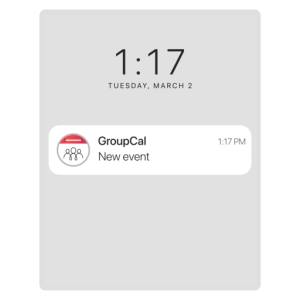
GroupCal offers full support for real-time updates. It features a sophisticated sync mechanism that keeps all members and devices up-to-date with the latest events. Whenever a new event is added, the update is immediately communicated to all members’ devices. Moreover, GroupCal leverages the notification mechanism available on both mobile devices and desktops to ensure that members are promptly notified of any changes.
Support for multiple shared calendars
For individuals with multiple commitments, managing several calendars is often a necessity. For instance, a shared family calendar, a shared work calendar, and a personal calendar may all be required. Therefore, a high-quality shared calendar application should be designed to support multiple calendars, allowing users to effortlessly manage and organize different schedules, both private and shared, while avoiding conflicts.
Moreover, the shareable calendar app should display all events from all calendars on the same calendar view, providing the user with a comprehensive overview of their commitments. However, there are cases where users may want to focus on a specific calendar, and the app should also provide this feature.
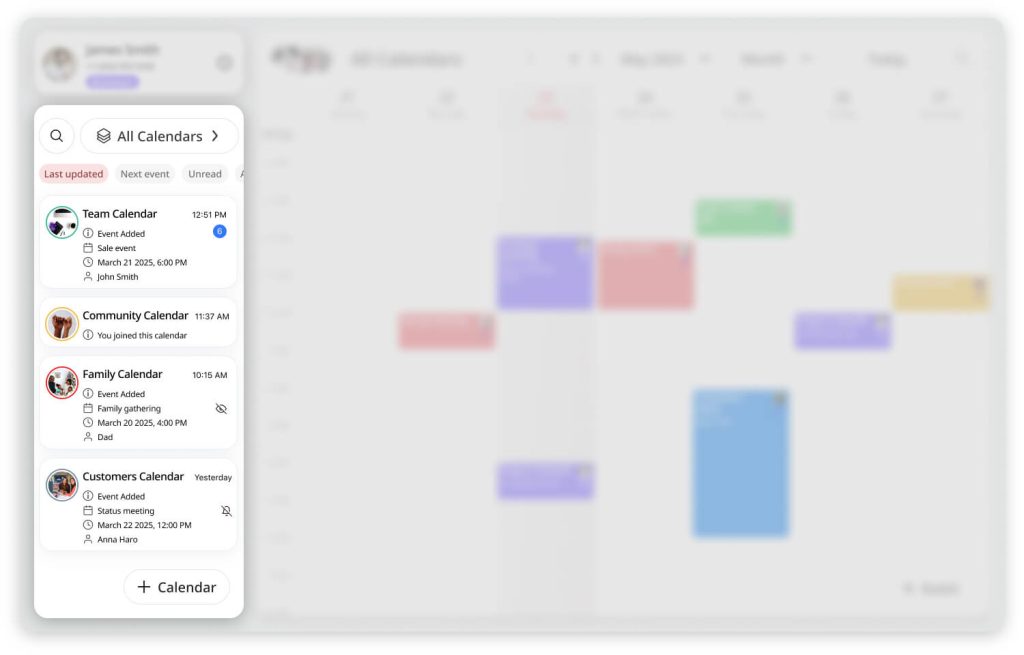
GroupCal enables users to create and manage multiple shared calendars that coexist seamlessly. It features a master view that displays all events from all calendars on a single screen, providing a unified and comprehensive view of one’s schedule. This allows users to efficiently manage multiple calendars and easily keep track of all their events in one place.
Permission management
In a shared calendar, permission management is a critical feature that determines the level of access granted to different members. Depending on the calendar’s purpose, some users may be restricted to read-only access, while others may require permission to modify events. For instance, a university control calendar may allow members to view events only, while a company calendar may permit some users with admin privileges to edit events, while others may have read-only access.
Furthermore, a shared calendar app should offer robust support for admins, enabling them to manage permissions, add or remove members, and make other changes as needed. This feature enhances collaboration and streamlines communication, allowing teams to work together effectively while ensuring that confidential information remains secure.
By providing flexible permission management, a shared calendar app can ensure that the right people have access to the right information at the right time, thereby enhancing productivity, minimizing errors, and fostering trust among team members.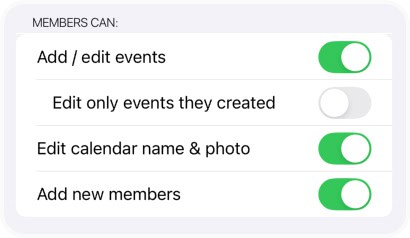
GroupCal boasts sophisticated permission management capabilities that enable users to control members’ actions effectively. This includes the ability to determine which actions members can take, as well as the option to assign calendar-specific administrators with elevated permissions.
Visualization using colors and photos
In a shared calendar, it’s crucial that events are easy to read and interpret, particularly when multiple calendars are displayed simultaneously. One effective way to achieve this is by using colors and photos. For example, a family calendar could use distinct colors to differentiate between various members’ events, while a work calendar could use colors to indicate different types of events, such as meetings, deadlines, or presentations.
Moreover, photos can also be utilized to identify events, allowing users to recognize specific events at a glance. For instance, each shared calendar could have its own photo, and events belonging to that particular calendar will display it.
A high-quality shared calendar app should provide users with the option to use colors and photos to visualize which events belong to which calendars and which members. This feature enhances the app’s usability, allowing users to quickly identify and prioritize events that are most relevant to them. By providing an intuitive and visually appealing interface, shared calendars become more user-friendly, reducing confusion and streamlining the scheduling process.

GroupCal allows users to set configurable colors for each calendar, making it easy to distinguish which events belong to which calendar on the master calendar screen. Furthermore, GroupCal displays the photo of the calendar on each event for added clarity. Additionally, users can set different colors for calendar members, ensuring that events added by each member are displayed in their designated color. With GroupCal’s customizable color scheme, users can quickly and easily identify events and track their schedules with ease.
Indicating what calendar has updated events
In a shared calendar, it’s important that users can easily track changes to events, ensuring everyone stays up-to-date. One effective way to achieve this is by providing notifications or alerts, similar to how chat apps indicate unread messages.
A high-quality shared calendar app should show users which events have been updated, who made the change, and when the change was made. This level of detail enhances the app’s usability, allowing users to quickly identify and understand what changes have been made.
Additionally, the app should also make it easy for users to view the event’s previous versions and compare the changes, providing a history of the event’s evolution. This feature is particularly useful when multiple users have access to the same calendar, as it allows for a clear understanding of the event’s progression over time.
Overall, a shared calendar app that provides detailed notifications, version history, and comparison tools, ensures that users always have a complete picture of events, enabling them to make informed decisions and avoid scheduling conflicts.
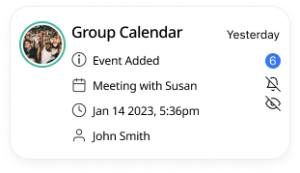
Similar to chat applications, GroupCal organizes the calendars based on the most recent updates. Next to each calendar, users can see the time of the last update, as well as an unread circle indicating the number of updates waiting to be viewed.
Cross-platform and support for mobile
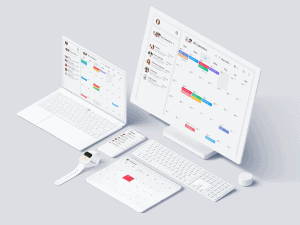
In our fast-paced modern world, it’s essential to be able to access and manage calendars from anywhere, at any time. This means having a shared calendar app that is cross-platform and accessible from multiple devices, including desktops, laptops, tablets, and smartphones.
A high-quality shared calendar app should provide seamless integration across multiple platforms, allowing users to effortlessly view and edit the calendar, regardless of the device they are using. This feature enhances the app’s convenience, providing users with the flexibility they need to manage their schedules effectively, whether they are in the office, on the go, or working remotely.
GroupCal offers a comprehensive suite of advanced applications for iOS, Android, and desktop devices. With its versatile cross-platform compatibility, GroupCal provides users with a seamless and consistent experience across all their devices.
Calendar Features
An effective shared calendar should offer users a wide range of calendar features, including various types of views, alerts, notifications, and reminders, to help them manage their schedules more efficiently and avoid missing important events.
For example, a shared calendar app should allow users to switch between different views, such as day, week, month, or year view, depending on their preferences and needs. This flexibility ensures that users can visualize their schedules in the way that works best for them and plan their time more effectively.
Moreover, the app should allow users to set up alerts, notifications, and reminders for upcoming events, helping them stay on top of their schedules and avoid missing important deadlines or appointments. This feature is particularly useful for busy professionals or individuals with hectic schedules, who need reminders to keep them organized and focused.
In addition to these features, a good shared calendar app should also offer other useful tools, such as the ability to search for specific events or create recurring events, enabling users to manage their schedules with ease and efficiency.
By providing users with these essential calendar features, a shared calendar app becomes a powerful tool that streamlines the process of managing schedules, helps users stay organized and on top of their priorities, and enhances their overall productivity and efficiency.
Private Calendar vs. Public Calendars
As mentioned earlier, shared calendars can be either private or public. Private calendars are intended for a specific group of people and are usually password-protected. Examples of private calendars include shared family calendars, shared company calendars, and shared class schedules. Only authorized members can access and view the events on the calendar. Private calendars are ideal for situations where sensitive information is being shared, or where only a select group of people should have access to the calendar.
On the other hand, public calendars are intended for the general public and can be viewed by anyone. Examples of public calendars include event calendars for churches, community centers, and public institutions. These calendars are intended to broadcast public events and are not password-protected. Public calendars are ideal for situations where event information needs to be widely disseminated to a large audience.
GroupCal features two types of calendars: private and channels. Calendar channels are designed to broadcast schedules to a wide audience and can have an unlimited number of members. These channels are searchable within GroupCal, making it easy for users to discover and join channels related to their interests.
Embedding a Shared Calendar on a Webpage
One of the most powerful features of shared calendars is the ability to embed them directly into a webpage. This functionality allows organizations, teams, or communities to display their schedules publicly or privately on their websites, making it easier for others to stay informed about upcoming events or deadlines. Embedding a shared calendar is particularly useful for businesses, schools, or event organizers who want to provide real-time updates to their audience without requiring them to download an app or create an account. By embedding a calendar, you can ensure that everyone has access to the latest schedule changes, and you can customize the display to match your website’s design. Tools like GroupCal make this process seamless, offering embeddable calendar widgets that sync in real-time with your shared calendar. This feature not only enhances transparency but also improves accessibility, ensuring that your audience can stay up-to-date with just a quick glance at your webpage. Whether it’s for a company’s event schedule, a school’s academic calendar, or a community organization’s activities, embedding a shared calendar is a simple yet effective way to keep everyone on the same page.
Conclusion
In conclusion, a shared calendar is an excellent tool for managing schedules and staying organized. It provides a centralized platform for tracking events, meetings, appointments, and deadlines, and allows multiple people to access and update the same information. With its real-time update feature, support for multiple shared calendars, and permission management capabilities, shared calendars are ideal for families, organizations, and groups of all sizes.
